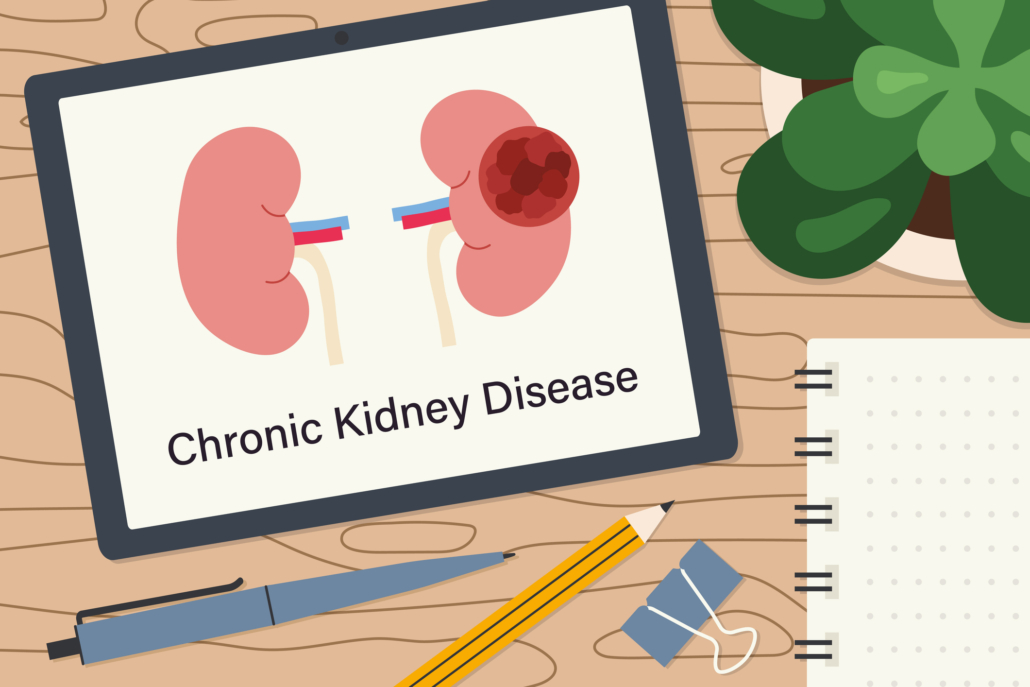Nutrition Plan for Chronic Kidney Disease – Long Island Renal Dietitian’s Recommendations
What is CKD?
Chronic kidney disease, or CKD, means your kidneys aren’t working as well as they should. The kidneys filter waste and extra fluid from your blood, which then leave your body as urine. When they cannot filter blood effectively, waste and fluid build up in the body. This damage usually progresses slowly and can lead to other health problems.
There are five stages of CKD. Stage 1 is the most mild form, and Stage 5 is the most severe. The stages are based on how much kidney function remains. Once the kidneys have lost nearly all their ability to work (Stage 5), the diagnosis is kidney failure or end-stage kidney disease, and dialysis or a kidney transplant is needed.
What is the goal of kidney disease treatment?
Though CKD unfortunately has no cure, you can improve your health and quality of life by managing the disease and its complications through dietary adjustments. The goal is to preserve kidney function—limiting progression and, in some cases, even seeing some improvement.
At the same time, nutrition can help manage related conditions like high blood pressure and diabetes, which further supports kidney health. According to the National Kidney Foundation, this can best be achieved when you work with a Registered Dietitian who provides Medical Nutrition Therapy (MNT) and a personalized nutrition plan.
What does a dietitian do for CKD?
A renal dietitian plays a vital role in CKD management by providing MNT. They assess, counsel, and educate you on how to adjust your diet to slow disease progression, manage complications, and improve overall health.
You will receive:
- Individualized Nutrition Assessment
- Medical Nutrition Education
- Meal Planning and Guidance on Food Choices
- Ongoing Monitoring and Adjustments
- Support for Managing Complications
- Strategies to Improve Quality of Life
What are the causes of chronic kidney disease?
The main causes of CKD are diabetes and high blood pressure.
Other causes include:
- Glomerular diseases
- Polycystic kidney disease (PKD)
- Kidney infections
- Urinary tract obstructions
- Certain medications and heavy metals
- Autoimmune diseases such as lupus
- Congenital defects
Heart failure, some cancers, and other systemic diseases can also impact kidney health.
Is CKD curable?
While CKD cannot be cured, nutrition interventions can reduce progression, improve quality of life, and may even extend life expectancy.
Treatment aims to:
- Slow or partially reverse progression
- Manage symptoms
- Address underlying conditions like high blood pressure and diabetes
- Support lifestyle changes such as following a renal diet, reducing sodium, and—when needed—limiting potassium and phosphorus, staying active, and maintaining a healthy weight
Nutrition Recommendations to Manage and Slow CKD: Nutritional Management of CKD – Implementing a Renal Diet
The cornerstone of a renal diet is managing protein—both type and amount. Research shows the benefits of a Plant-Dominant Low-Protein Diet (PLADO): enough protein for health, but not so much that it stresses the kidneys.
- Plant proteins such as beans, lentils, peas, tofu, nuts, and seeds are emphasized.
- Lean animal proteins like dairy, eggs, fish, and poultry may be included.
- Red and processed meats increase risk and should be limited.
Other important parts of the renal diet include reducing salt and, when medically indicated, limiting phosphorus and potassium. A Mediterranean-style pattern supports a healthy protein balance, lowers acid load, and benefits gut health.
Foods to include if you have CKD:
- Plant-based proteins: beans, lentils, peas, tofu, nuts, seeds
- Lean animal proteins: fish, poultry, eggs, dairy
- Whole grains and starchy vegetables
- Fresh fruits and non-starchy vegetables
- Healthy fats such as olive oil, avocado, nuts, and seeds
Foods to limit or avoid if you have CKD:
- Red and processed meats
- High-sodium foods (packaged snacks, canned soups, deli meats)
- Ultra-processed foods with additives
- Foods high in phosphorus or potassium, if advised by your dietitian
I have worked with individuals for over 30 years, helping them manage kidney disease through evidence-based dietary interventions. With online medical nutrition therapy, you’ll have the tools and education you need to improve your health and preserve kidney function.
Learn More:



